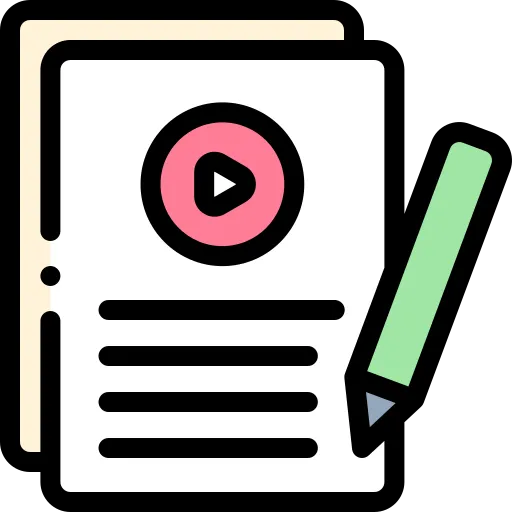
Start Advertising With Videos Today!
Let's Help You:
🚀 Transform Ideas into Reality
🔥 Boost Engagement
🌐 Connect With Your Audience
📈 Make More Sales & Leads
Here's How I Can Help You:

Explainer Videos
Animated or live-action videos designed to explain your product, service, or idea in a concise and engaging way, in order to boost your sales with a better ROI.

Interactive Videos
Engaging multimedia content that allows users to actively participate and interact with the video, such as clickable hotspots, quizzes, and branching scenarios.

Video Scriptwriting
Professionally written scripts for various types of videos, including commercials, explainer videos, training videos, and more.
My Portfolio
Company Promo Videos
Animated Promo Videos
Ecommerce Videos
SaaS Promo Videos
Small Call to Action Headline
Ready to get started?
Small Call to Action Headline

Video Marketing Specialist
AI Systems Builder
If you're looking to add some personality and professionalism to your brand, then contact me today. I am an expert in corporate video production and I will work tirelessly to produce amazing videos that will get you the results you need.
I have extensive experience working in the corporate world and know exactly what it takes to create a marketing video that is relevant and engaging.
I have worked with companies such as Delloite, SwishFiber, Business Credit Coaching & Consulting, Whiterock AI, and many more. Whether you're looking for a personalised video to market a new product or a company promo video, I can help.
I use some of the best equipment, tools, and team to produce high-quality videos for your various needs.
Contact me today for a free quote!
Blog Posts

Marketing automation for B2B companies
“If you want to sell more, make it easy for people to buy.”
- TA
Introduction:
Marketing automation has become an increasingly important tool for B2B companies looking to optimize their sales and marketing processes. By automating certain marketing tasks, businesses can save time and energy, while building more efficient, effective campaigns.
Automation can be used in a variety of ways, from increasing lead generation to streamlining customer service. By leveraging the technology, B2B companies can gain a competitive edge and achieve greater success.
In this blog post, we will explore the power of marketing automation for B2B companies and how it can be used to drive better results. We'll look at the different tasks that can be automated, as well as the potential benefits for businesses.
Additionally, we'll discuss the challenges that come with automation and tips for getting started. With the right strategies and tools, B2B companies can leverage automation to boost efficiency, reduce costs, and improve customer relationships.

Understanding B2B Marketing Automation
Understanding B2B marketing automation is critical for businesses that aim to increase visibility, engage customers, and improve efficiency. Automation helps streamline processes, allowing businesses to focus on other tasks.
Automation also helps businesses to save time, energy, and money by automating tedious tasks. This can include processes such as lead generation, email marketing, and customer segmentation.
Automation can also provide businesses with detailed insights into customer behaviour and preferences, which can be used to develop more effective marketing campaigns.
By leveraging the power of automation, businesses can more efficiently manage their marketing efforts, resulting in improved customer engagement and higher ROI.
Applications of Marketing Automation in B2B Business Operations
1. Lead nurturing:
Lead nurturing is an essential part of marketing automation for B2B companies, allowing them to provide personalized content to leads and prospects. With lead nurturing, businesses can target specific messages to the right audience at the right time.
This helps to move leads down the sales funnel in an efficient manner and increase conversions. Lead nurturing also helps to build relationships with prospects, as businesses are able to send timely, relevant messages that show their knowledge of the lead's interests and needs.
With the right lead nurturing strategies in place, B2B companies can ensure that their leads and prospects receive the right content at each stage of their buying journey.
2. Automated email campaigns:
Automated email campaigns are one of the most effective ways to engage with your B2B clients. Automated emails are emails sent automatically and in a predetermined sequence. These emails can be triggered based on a variety of factors, such as a customer’s behaviour or a specific date or event.
Automated emails can help you engage with and retain your customers, as well as increase customer loyalty. You can send welcome emails, order confirmations, reminder emails, or thank-you emails.
Automated emails also allow you to segment your customer base, send targeted and personalized messages, and provide real-time feedback. Automated email campaigns help you stay top-of-mind with your clients and build relationships with them.
3. Segmentation and personalization:
Segmentation and personalization are two key components of marketing automation. Segmentation involves dividing your target audience into smaller groups based on shared demographic, geographic, or behavioural characteristics.
By segmenting your audience, you can create more targeted campaigns that will speak directly to the needs and interests of each group. Personalization takes segmentation a step further by customizing content and messages for each individual customer.
This helps to increase engagement, build trust, and encourage customers to take the desired action.
4. Lead scoring:
Lead scoring is an essential part of marketing automation for B2B companies. It is the process of assigning points or "scores" to leads based on their demographic data, activity, and other criteria. By doing this, you can quickly identify which leads are most likely to convert into customers.
Lead scoring can also help you figure out which leads are most likely to respond to certain offers or messages. This allows you to target your campaigns more effectively, saving you time and money.
5. Reporting and analytics:
It’s important to measure the success of your marketing efforts, and reporting and analytics give you the data you need to do just that. With marketing automation, you can track the performance of your campaigns, measure ROI, and gain insights into the effectiveness of your strategies.
You can also use reporting and analytics to determine which channels are performing best and make adjustments to your campaigns accordingly. This way, you can maximize your reach and get the most out of your marketing automation efforts.
Benefits of Automation for B2B Companies
Automation provides a range of benefits for B2B companies.
Automation can help reduce costs, increase efficiency, and improve customer experience. It can free up resources for other tasks and provide a more consistent process.
Automation can help streamline processes, allowing for faster response times and improved customer service.
Automation can also reduce the need for manual data entry, leading to increased accuracy and fewer mistakes.
Automation can also reduce the amount of time required to complete tasks, allowing more time for research, development, and other activities.
Automation can also increase visibility and access to data, improving decision-making and resulting in better business performance.
In summary, automation provides a range of benefits for B2B companies, including cost savings, improved customer experience, more accurate data, and improved business performance.
Challenges of Automation for B2B Companies
The challenges of automation for B2B companies are numerous and require careful consideration.
Automation can lead to a loss of control and the ability to respond quickly to customer inquiries or market changes.
It can also be difficult to create a seamless integration of automated processes into existing systems and practices.
Additionally, automation can lead to a loss of customer feedback and customer engagement, which can reduce customer satisfaction and loyalty.
Automation also has the potential to create more complex systems and processes, which can lead to increased costs and difficulty in maintaining quality control.
Finally, automation can lead to a decrease in the number of jobs available for human workers, which can lead to a loss of value and morale.
All of these factors together create a complex environment that requires careful planning and implementation in order to be successful.
Best Practices for Implementing Automation
Best practices for implementing automation involve careful planning and execution. Before beginning the process of automation, an organization should assess its current processes and identify areas where automation can be most beneficial. Organizations should also consider the potential risks associated with automation and develop strategies to mitigate them. It is important to consider the impact of automation on the employees and ensure that they are properly trained to use the technology. Additionally, automation should be implemented incrementally and tested thoroughly before full deployment. Organizations should also have a backup plan in place in the event of an error or system failure. Finally, it is important to establish communication and collaboration channels between the automation team, the IT team, and the rest of the organization. By following these best practices, organizations can ensure successful and sustainable automation implementation.
The Future of Automation for B2B Companies
The future of automation for B2B companies is incredibly promising. Automation tools can help B2B companies streamline processes, reduce costs, and improve accuracy. These tools can automate tasks such as customer service, billing, data entry, and inventory management, freeing up staff to focus on more important tasks. Additionally, automation increases the speed of operations and can provide valuable real-time insights and analytics to help B2B companies make informed decisions. Automation is also a key component in creating a customer-centric approach to business, allowing B2B companies to quickly and accurately meet the needs and preferences of their customers. The possibilities of automation are endless, and it will continue to be an invaluable asset to B2B companies in the years to come.
Conclusion
In conclusion, B2B Marketing Automation is an invaluable tool for companies looking to maximize their marketing efforts and increase their ROI. It can help companies streamline their processes, save time and money, and reach their target audiences more effectively. While there are potential challenges that come with automation, these can be overcome with proper planning and best practices. As technology advances, the future of automation for B2B companies looks bright and full of potential.
Questions or Enquiries?
If you'd like to talk about working together, feel free to send me a message :)
Subscribe to our newsletter
Stay up-to-date with marketing trends and techniques to help you grow your business

© 2023 - Texygee Creatives

